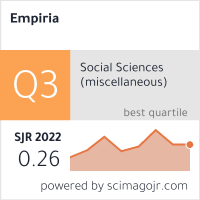“Ya no estás sola”: tramas, personajes y guiones. Experimentaciones con la ficción radiofónica desde la etnografía colaborativa
DOI:
https://doi.org/10.5944/empiria.57.2023.36432Keywords:
etnografía colaborativa, ficción radiofónica, escritura, trabajo de campo, representación, collaborative ethnography, radio fiction, writing, fieldwork, representationAbstract
The purpose of this paper is to reflect on an experience of fictional ethnographic writing that we made while doing collaborative research. Through an exercise of memory, imagination and investigation, we created a radio fiction series together with a social movement that fights for the right to decent housing: Stop Desahucios Granada 15M. Starting from the materiality of one of the scripts that form part of our series, a radio soap opera, we want to show how we jointly wrote the six episodes of the series by constructing first the plots and characters, and after the dialogues. Secondly, we’ll reflect on the performative aspects of the production process, in which we transgressed the scripts. Thirdly, we will address two ‘mutations’ that the collaborative framework of our fiction-based research had generated in our way of doing and communicate ethnography. And finally, we’ll explain the reasons why we consider the writing of the scripts as a central element of our collaborative ethnography.
Downloads
Downloads
Published
How to Cite
Issue
Section
License
Copyright (c) 2022 Empiria. Revista de metodología de ciencias sociales

This work is licensed under a Creative Commons Attribution-NonCommercial-ShareAlike 4.0 International License.
Los autores que publican en esta revista están de acuerdo con los siguientes términos:a) Los autores conservan los derechos de autor y garantizan a la revista el derecho de ser la primera publicación del trabajo al igual que licenciado bajo una Licencia Internacional Creative Commons CC BY-NC-SA 4.0.
b) Se permite y se anima a los autores a difundir electrónicamente las versiones pre-print (versión antes de ser evaluada) y/o post-print (versión evaluada y aceptada para su publicación) de sus obras antes de su publicación, ya que favorece su circulación y difusión más temprana y con ello un posible aumento en su citación y alcance entre la comunidad académica.









